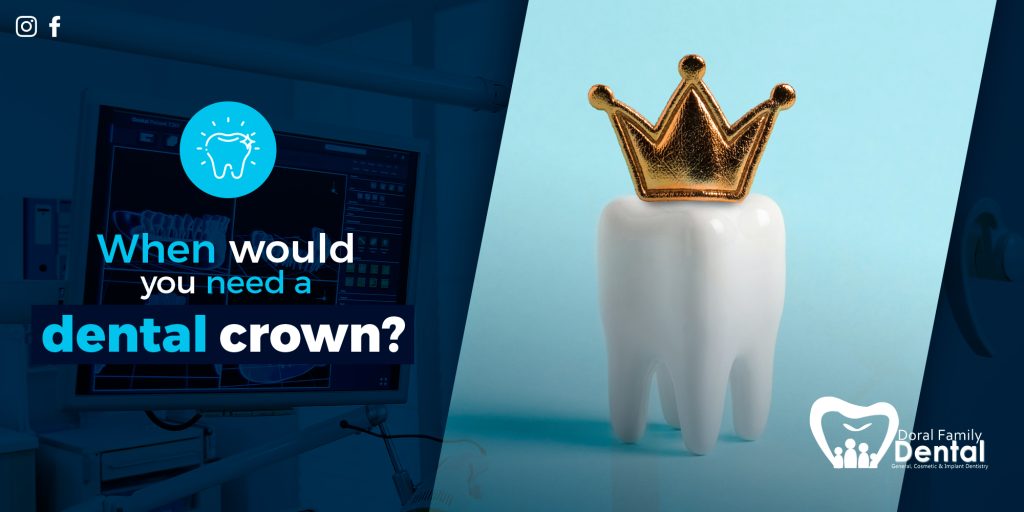When would you need a dental crown?

Crowns serve several purposes. You may need a dental crown to:
- Strengthen a weak tooth.
- Protect and support a cracked tooth.
- Restore a worn-down or broken tooth.
- Hold a dental bridge in place.
- Cover a severely stained or discolored tooth.
- Cover a root canal-treated tooth.
- Cover a dental implant.
Types of dental crowns
There are many types of dental crowns. The kind that’s right for you depends on your personal preferences and unique oral health needs.
Metal crowns
Dental technicians use several metals to make dental crowns, including gold, palladium, nickel and chromium. Metal crowns rarely chip or break, last the longest in terms of wear and only require a small amount of enamel removal. They can also withstand biting and chewing forces.
The metallic color is the main drawback of this type of crown. Metal crowns are a good choice for out-of-sight molars.
Porcelain-fused-to-metal (PFM) crowns
Porcelain-fused-to-metal (PFM) crowns combine the durability of metal and the natural look of porcelain. Dentists can match these crowns to the shade of your own teeth.
Despite their strength, PFM crowns have some drawbacks. For example, the porcelain coating may chip off over time, exposing the metal underneath. In addition, PFM crowns may gradually wear down the enamel on your opposing teeth (the teeth that touch your crown when you close your mouth).
PFM crowns last almost as long as metal crowns. They can restore both front and back teeth.
Pressed ceramic crowns
A pressed ceramic crown has a hard inner core. It’s similar to a PFM, but the core is ceramic instead of metal. To make this inner core, a technician melts and presses ceramic in an oven at a very high temperature. Next, they add multiple layers of porcelain. Like all-porcelain crowns, pressed ceramic crowns mimic the translucency of natural tooth enamel.
Pressed ceramic crowns have the same drawbacks as PFM crowns. The layers of ceramic can chip away over time. Dentists use pressed ceramic crowns on front and back teeth.
All-ceramic or porcelain crowns
All-ceramic or porcelain crowns mimic the appearance of tooth enamel more than any other crown type. They’re also a good choice if you have metal allergies.
Lab technicians use many different materials to make ceramic crowns, but one of the most popular is zirconium dioxide. Zirconia crowns are extremely durable and can withstand heavier forces than other types of ceramic crowns. They’re also gentle on your opposing teeth, resulting in less enamel wear.
Same-day dental crowns
Many dentists use CAD/CAM (computer-aided design and manufacturing) technology to create crowns in their office while you wait. This software allows your dentist to take digital dental impressions of your teeth, and then use those impressions to design a custom crown. Once your dentist designs your crown, they’ll send the image files to an on-site milling machine. The machine will craft your new crown from a solid block of ceramic.
The main advantage of CAD/CAM technology is that you can get a dental crown in just one office visit. However, same-day crowns aren’t for everyone. Ask your dentist if you’re a candidate.
All-resin crowns
Dental crowns made out of resin are generally less expensive than other types of crowns. But they’re fragile and more likely to break compared to porcelain-fused-to-metal (PFM) crowns.
Dentists often use resin to make temporary crowns. They last three to five years on average.
What are the benefits of dental crowns?
The most notable advantage of a dental crown is that it can prolong the life of a natural tooth. Specifically, crowns can:
- Treat worn, broken or decayed teeth.
- Protect teeth from erosion (wear and tear).
- Improve chewing function.
- Enhance your appearance.
- Last between five and 15 years with proper care.
What are the disadvantages of dental crowns?
There are also some disadvantages. For example, crowns:
- Require some removal of natural tooth enamel.
- May cause teeth sensitivity, especially in the first few weeks after placement.
- Can break or fracture over time.
- Can trap bacteria and lead to decay if they don’t fit properly.
- May cause an allergic reaction in some people. (This is rare.)
- May be expensive.
When should I call a dentist?
If you have a dental crown, you should call your dentist if you notice:
- A loose crown.
- Bad breath or a bad taste.
- Cracks or chips in your crown.
- Sharp edges that bother your tongue or gums.
Free Consultation
Lorem ipsum dolor sit amet, consectetur adipiscing elit. Ut elit tellus.
Make An appointment
Click here if you want to make an appointment with us directly.

Quick Contact
- 305.960.7734
- 7800 NW 25th ST #11, Doral FL 33122
- info@doralfamilydental.com
- Doral Family Dental 2022. All Right Reserved


